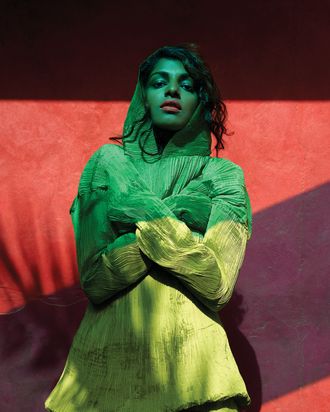
At only 41, with just five albums to her name, M.I.A. is saying that September’s dance-pop salvo A.I.M. will be her last. If this is truly farewell, it’s a much warmer one than we might have anticipated back in the days of her breakout single “Paper Planes,” which drew so much insurrectionary energy from its use of sampled shotgun blasts. But to hear Maya Arulpragasam tell it, this trajectory — call it maturation — is entirely deliberate. “There’s no complaints on it,” she told BBC Radio 1 upon unveiling the new album’s powerhouse “Go Off,” co-produced by EDM whiz Skrillex and her longtime collaborator Blaqstarr. “There’s another side to me completely. I don’t know if people know that.”
They will now. The first single, “Borders,” verges on bubbly. And so does the rest of A.I.M., a welcoming blend of old-school hip-hop, dancehall, dubstep, and Eastern textures. It’s a sharp contrast with her earlier work, which fired lyrics about POWs and displaced migrants over propulsive bursts of dance music. This sunny disposition is an unlikely bookend to a career that began with biting, world-conscious pop splatter paintings like “Galang” and “Bucky Done Gun,” and it comes, curiously, after a summer full of violent racial injustice — the sort of political atmosphere that M.I.A., the daughter of Sri Lankan militants, always seemed to know was on the verge of descending.
M.I.A.’s ascent into pop’s mainstream followed critical acclaim for the explosive meld of Brazilian baile funk, hip-hop, and agitprop that informed her earliest work: the 2004 mixtape Piracy Funds Terrorism and 2005’s studio debut, Arular. In 2007, “Paper Planes” hit. In 2009, she delivered a memorable Grammy Awards performance as the lone woman MC rapping with Jay Z, T.I., Lil Wayne, and Kanye West. She was a pop star, but a politically rebellious one.
That tricky balance couldn’t hold, and it was partially M.I.A.’s own fault. She famously reacted to a withering New York Times Magazine profile — she was held up as a truffle-fries-eating radical poseur — by petulantly tweeting out the writer’s phone number. And she breached etiquette at America’s biggest moment of communal worship, flashing a middle finger during a Super Bowl halftime-show appearance alongside Madonna and Nicki Minaj. (Yes, it’s worth remembering that M.I.A., not all that long ago, was enough of a pop-culture force to be invited to perform at the Super Bowl.) Those gaffes might’ve been survivable if, all the while, her art hadn’t been flattening. First, there was 2010’s joyless Maya — the video for the bludgeoning “Born Free,” all tediously provocative sex, explosions, and tuneless Suicide riffs, showed where her head was — which she followed with the slightly less hectoring but unfocused Matangi.
A.I.M.’s apparent pivot away from overt agitation will scan to many as a gesture of resignation after years of the singer’s courting public controversy, but in foregrounding hooks ahead of messages, it serves as a reminder of her gifts as a purveyor of vital pop music. The album’s not devoid of a rebel pulse: “Guns blow doors to the system” goes the chorus to “Borders.” “Yeah, fuck ’em when we say we’re not with them.” In the self-directed music video, she delivers the lyric on a beach, standing atop a platform surrounded by young men whose bodies outline the shape of a barge. M.I.A. isn’t ducking the world’s ills. Instead, she’s recalibrating the distance between her playful pop smarts and the advocacy and criticism about which she’s passionate. As John Lennon once said, the trick is to “put your political message across with a little honey.” M.I.A. knew that lesson from the start, forgot it for a while, and seems to have remembered it again, just in time to say good-bye.
*This article appears in the August 22, 2016 issue of New York Magazine.



